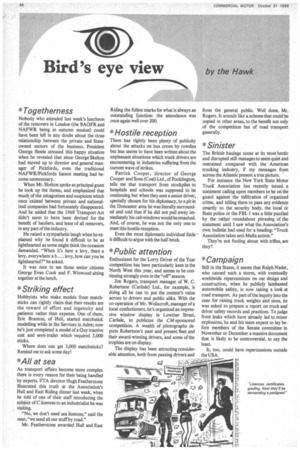Bird's eye view
Page 50

If you've noticed an error in this article please click here to report it so we can fix it.
by the Hawk *Togetherness
Nobody who attended last week's luncheon of the removers in London (the BAOFR and NAFWR being in autumn session) could have been left in any doubt about the close relationship between the private and Stateowned sectors of the business. President George Steele stressed this happy situation when he revealed that since George Skelton had moved up to director and general manager of Pickfords, even the traditional NAFWR/Pickfords liaison meeting had become unnecessary.
When Mr. Skelton spoke as principal guest he took up the theme, and emphasized that much of the antagonism and suspicion which once existed between private and nationalized companies had fortunately disappeared. And he added that the 1968 Transport Act didn't seem to have been devised for the benefit of hauliers, and least of all removers, in any part of the industry.
He raised a sympathetic laugh when he explained why he found it difficult to be as lighthearted as some might think the occasion demanded. -When it's here a levy, there a
levy, everywhere a b levy, how can you be lighthearted?" he asked It was nice to see those senior citizens George Evan Cook and F. Winwood sitting together at the lunch.
*Striking effect
Hobbyists who make models from matchsticks can rightly claim that their results are the reward of effort and ingenuity and patience rather than expense. One of them, Eric Branton, of Hull, started matchstick modelling while in the Services in Aden; now he's just completed a model of a Guy tractive unit and semi-trailer which required 3,0(K) sticks.
Where does one get 3,000 matchsticks? Remind me to ask some day!
*All at sea
As transport affairs become more complex there is every reason for their being handled by experts. FTA director Hugh Featherstone illustrated this truth at the Association's Hull and East Riding dinner last week, when he told of one of their staff introducing the subject of C licences to an industrialist he was visiting.
"No, we don't need sea licences," said the man, "we send all our stuff by road."
Mr. Featherstone awarded Hull and East Riding the fullest marks for what is always an outstanding function: the attendance was once again well over 200.
*Hostile reception
There has rightly been plenty of publicity about the attacks on bus crews by rowdies but less seems to have been written about the unpleasant situations which truck drivers are encountering in industries suffering from the current wave of strikes.
Patrick Cooper, director of George Cooper and Sons (Coal) Ltd., of Pocklington, tells me that transport from stockpiles to hospitals and schools was supposed to be continuing but when they sent a senior driver, specially chosen for his diplomacy, to a pit in the Doncaster area he was literally surrounded and told that if he did not pull away immediately his cab windows would be smashed. And, of course, he was not the only one to meet this hostile reception.
Even the most diplomatic individual finds it difficult to argue with the half-brick.
*Pubhc attention
Enthusiasm for the Lorry Driver of the Year competition has been particularly keen in the North West this year, and seems to be continuing strongly even in the "off" season.
Jim Rogers, transport manager of W. C. Robertson (Carlisle) Ltd„ for example, is doing all he can to put the contest's value across to drivers and public alike. With the co-operation of Mr. Woliscroft, manager of a local confectioners, he's organized an impressive window display in Lowther Street, Carlisle, to publicize the CM-sponsored competition. A wealth of photographs depicts Robertson's past and present fleet and their award-winning drivers, and some of the trophies are on display.
The display has been attracting considerable attention, both from passing drivers and from the general public. Well done, Mr. Rogers. It sounds like a scheme that could be copied in other areas, to the benefit not only of the competition but of road transport generally.
*Sinister
The British haulage scene at its most hectic and disrupted still manages to seem quiet and restrained compared with the American trucking industry, if my messages from across the Atlantic present a true picture.
For instance the New York State Motor Truck Association has recently issued a statement calling upon members to be on the guard against the infiltration of organized crime, and telling them to pass any evidence smartly to the security body, the local or State police or the FBI. I was a little puziled by the rather roundabout phrasing of the statement until I saw what the Association's own bulletin had used for a heading: "Truck Association takes anti-Mafia action."
They're not fooling about with trifles, are they?
*Campaign
Still in the States, it seems that Ralph Nader, who caused such a storm, with eventually worldwide repercussions on car design and construction, when he publicly lambasted automobile safety, is now taking a look at road transport. As part of the inquiry into the case for raising truck weights and sizes, he was asked to prepare a report on truck and driver safety records and practices. To judge from leaks which have already led to minor explosions, he and his team expect to lay before members of the Senate committee in November or December a massive document that is likely to be controversial, to say the least.
It, too, could have repercussions outside the USA.


























































































































